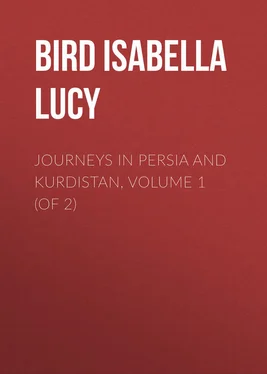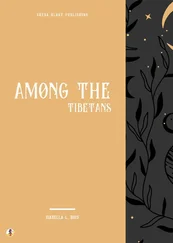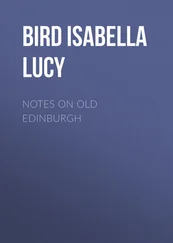Isabella Bird - Journeys in Persia and Kurdistan, Volume 1 (of 2)
Здесь есть возможность читать онлайн «Isabella Bird - Journeys in Persia and Kurdistan, Volume 1 (of 2)» — ознакомительный отрывок электронной книги совершенно бесплатно, а после прочтения отрывка купить полную версию. В некоторых случаях можно слушать аудио, скачать через торрент в формате fb2 и присутствует краткое содержание. ISBN: , Жанр: foreign_language, foreign_antique, foreign_prose, Путешествия и география, на английском языке. Описание произведения, (предисловие) а так же отзывы посетителей доступны на портале библиотеки ЛибКат.
- Название:Journeys in Persia and Kurdistan, Volume 1 (of 2)
- Автор:
- Жанр:
- Год:неизвестен
- ISBN:http://www.gutenberg.org/ebooks/38827
- Рейтинг книги:4 / 5. Голосов: 1
-
Избранное:Добавить в избранное
- Отзывы:
-
Ваша оценка:
- 80
- 1
- 2
- 3
- 4
- 5
Journeys in Persia and Kurdistan, Volume 1 (of 2): краткое содержание, описание и аннотация
Предлагаем к чтению аннотацию, описание, краткое содержание или предисловие (зависит от того, что написал сам автор книги «Journeys in Persia and Kurdistan, Volume 1 (of 2)»). Если вы не нашли необходимую информацию о книге — напишите в комментариях, мы постараемся отыскать её.
Journeys in Persia and Kurdistan, Volume 1 (of 2) — читать онлайн ознакомительный отрывок
Ниже представлен текст книги, разбитый по страницам. Система сохранения места последней прочитанной страницы, позволяет с удобством читать онлайн бесплатно книгу «Journeys in Persia and Kurdistan, Volume 1 (of 2)», без необходимости каждый раз заново искать на чём Вы остановились. Поставьте закладку, и сможете в любой момент перейти на страницу, на которой закончили чтение.
Интервал:
Закладка:
The Turkish host evidently did not know what to do with such an embarrassing guest as a European woman, and solved the difficulty by giving me the guest-chamber in the men's house, a most fortunate decision, as I have had quiet and privacy for three days. Besides, this room has a projecting window, with panes of glass held in by nails, and there is not only a view of the alley with its slush, but into the house of some poor folk, and over that to the Holwan, sometimes in spate, sometimes falling, and through all the hours of daylight frequented by grooms for the purpose of washing their horses. Some shingle banks, now overflowed, sustain a few scraggy willows, and on the farther side is some low-lying land. There may be much besides, but the heavy rain-clouds blot out all else.
My room is whitewashed, and is furnished with Persian rugs, Austrian bent-wood chairs, and a divan in the window, on which I sleep. Lamps, samovars , and glasses are kept in recesses, and a black slave is often in and out for them. Otherwise no one enters but Hadji. I get my food somewhat precariously. It is carved and sent from table at the beginning of meals, chiefly pillau, curry, kabobs , and roast chicken, but apparently it is not etiquette for me to get it till after the men have dined, and it is none the better for being cold.
The male part of the household consists of the Governor and his brother-in-law, a Moslem judge, and the quarantine doctor, a Cretan, takes his meals in the house. The Governor and doctor speak French. My fellow-traveller lives with them.
The night we arrived, the Governor in some agitation asked me to go and see his wife, who is very ill. The cholera has only just disappeared, and the lady had had a baby, which died of it in three days, and "being a boy her heart was broken," and "something had come under her arm." So I went with him into the haram , which seemed crowded with women of various races and colours, peeping from behind curtains and through chinks of doors, tittering and whispering. The wife's room is richly carpeted and thoroughly comfortable, with a huge charcoal brazier in the centre, and cushions all over the floor, except at one end, where there is a raised alcove with a bed in it.
On this the lady sat – a rather handsome Kurdish woman, about thirty-five, dressed in a silk quilted jacket, and with a black gauze handkerchief round her head, and a wadded quilt over her crossed legs. She was supported by a pile of pillows. Since then I have been sent for to see her several times every day, and found her always in the same position. There is surely something weird about it. She says she sits there all night, and has not lain down for two months. A black slave was fanning her, and two women, shrouded in veils of tinselled gauze, sat on the bed combing her luxuriant hair. She is not really beautiful at all, but her husband assures me constantly that she is " une femme savante ." She has property and the consideration which attaches to it. She was burning with fever and very weak.
I had scarcely returned to my room when my host sent again, begging that I would go back and see the doctor. I found that it was expected that I should persuade the lady to consent to have the abscess, or whatever it is, reopened. The room was full of women and eunuchs, and the chief eunuch, an elderly Arab, sat on the bed and supported her while the doctor dressed the wound, and even helped him with it. Her screams were fearful, and five people held her with difficulty. Her husband left the room, unable to bear her cries.
Quite late I was sent for again, and that time by the lady, to know if I thought she would die. It appears that her brother, the judge, remains here to see that she is not the victim of foul play, but I don't like to ask to whom the suspicion points, or whether our host, although the civil governor, keeps him here that he may not be suspected in case his rich wife dies.
Except for the repeated summonses to the sick-room, a walk on the slime of the roof when the rain ceases for a time, and on the balcony of the haram when it does not, and a study of the habits of my neighbours over the way, it is very dull. I have patched and mended everything that gave any excuse for either operation, have written letters which it is not safe to post, and have studied my one book on Persia till I know it throughout, and still the rain falls nearly without cessation and the quagmires outside deepen.
So bad is it that, dearly as Orientals love bazars and hammams , Hadji refuses leave to go to either. I remarked to him that he must be glad of such a rest, and he replied in his usual sententious fashion: "They who have to work must work. God knows all." I fear he is very lazy, and he has no idea of making one comfortable or of keeping anything clean. He stamps the mud of the courtyard into the carpets, and wipes my plates without washing them, with his shirt. He considers that our host has attained the height of human felicity. "What is there left to wish for?" he says. "He has numbers of slaves, and he's always buying more, and he's got numbers of women and eunuchs, and everything, and when he wants money he just sends round the villages. God is great! Ya Allah! "
Khannikin, being the nearest town to the Persian frontier, should be a place of some importance. It is well situated at an altitude of 1700 feet among groves of palms, on both banks of the Holwan, and having plenty of water, the rich alluvium between it and Yakobiyeh is able to support its own population, though it has to import for caravans. Most of the Persian trade with Baghdad and thousands of Shiah pilgrims annually pass through it. It is a customs station, and has a regiment of soldiers. Nevertheless, it is very ruinous, and its population has diminished of late years from 5000 to about 1800 (exclusive of the troops), and of this number a fifth have been carried off by cholera within the last few weeks. It has no schools, and no special industries. The stamp of decay rests upon it. Exactions, crushing hope out of the people, the general insecurity of property, and the misrule which has blighted these fine Asiatic provinces everywhere, sufficiently explain its decadence.
The imposition of quarantine on arrivals from Persia has all but stopped the supply of charcoal, and knowing the scarcity in the house, I am going without a fire, as most of the inhabitants are doing. A large caravanserai outside the walls is used as a quarantine station, and three others are taken as lazarettos. Out of these arrangements the officials make a great deal of money in fees, but anything more horrible than the sanitary state of these places cannot be conceived. The water appears to be the essence of typhoid fever and cholera, and the unfortunate détenus are crowded into holes unfit for beasts, breathing pestiferous exhalations, and surrounded by such ancient and modern accumulations of horrors that typhus fever, cholera, and even the plague might well be expected to break out.
Yesterday, for a brief interval, hills covered with snow appeared through rolling black clouds, and a change seemed probable, but rain fell in torrents all night; there is a spate in the river, and though we were ready to start at eight this morning, the katirgis declined to move, saying that the road could not be travelled because of the depth of the fords and the mud.
The roof, though a good one, is now so leaky that I am obliged to sleep under my waterproof cloak, and the un-puttied window-frames let in the rain. Early this morning a gale from the south-west came on, and the howling and roaring have been frightful, the rain falling in sheets most of the time. Sensations are not wanting. One of the orderlies is seriously ill, and has to be left behind under medical care till he can be sent to India, – the second man who has broken down. A runner came in with the news that all caravans are stopped in the Zagros mountains by snow, which has been falling for five days, and that the road is not expected to be open for a fortnight. Later, the Persian agent called to say that on the next march the road, which is carried on a precipice above the river, has slid down bodily, and that there are fifteen feet of water where there should be only two. Of course this prolonged storm is "exceptional." The temperature is falling, and it is so cold without a fire that though my bed is only a blanket-covered dais of brick and lime, dripped upon continually, in a window with forty draughts, I am glad to muffle myself up in its blankets and write among wraps.
Читать дальшеИнтервал:
Закладка:
Похожие книги на «Journeys in Persia and Kurdistan, Volume 1 (of 2)»
Представляем Вашему вниманию похожие книги на «Journeys in Persia and Kurdistan, Volume 1 (of 2)» списком для выбора. Мы отобрали схожую по названию и смыслу литературу в надежде предоставить читателям больше вариантов отыскать новые, интересные, ещё непрочитанные произведения.
Обсуждение, отзывы о книге «Journeys in Persia and Kurdistan, Volume 1 (of 2)» и просто собственные мнения читателей. Оставьте ваши комментарии, напишите, что Вы думаете о произведении, его смысле или главных героях. Укажите что конкретно понравилось, а что нет, и почему Вы так считаете.












